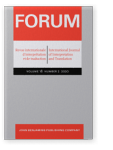Vol. 18:2 (2020) ► pp.111–126
Lin Shu as a translator
Striking a balance between domestication and foreignization at the turn of the twentieth century
As a pioneer of Chinese translation, Lin Shu groped for a way out of the dichotomy to achieve a balance between foreignization and domestication. His domesticating strategies have enjoyed considerable attention from critics, whereas his foreignization has so far been largely ignored. Mainly concentrating on his collaborative translation, Yinbian yanyu, this essay opens a window to see Lin’s translation strategy as an inevitable mixture of domestication and foreignization, and throws light on the contradictory nature of Lin, identifying him as both a defender and an opponent of Confucian ideology, and as both an inheritor and an innovator of Chinese literary and linguistic traditions.
Article outline
- 1.A period of chaos, a period of transition
- 2.A defender of confucianism and its opponent
- 3.An inheritor and an initiator of literary tradition
- 4.Struggling on the fringe, balancing between the two
- Conclusion
- Acknowledgements
- Notes
-
References
